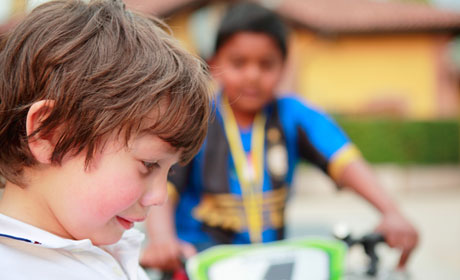
Pre-school children are no strangers to conflict, with fights over sharing toys, a tendency to resort to temper tantrums, and an obsession with what’s fair. Kids of this age are quick to express their emotions and aggression is often displayed openly because they are still learning what kind of behaviour is appropriate.
What is Pre-School Bullying?
Physical: Hitting, kicking, biting, destroying what others have made, taking toys away from others.
Verbal: Name calling (“cry baby”), mocking, hurtful teasing or threatening.
Social: Excluding others from the group (“you can’t play with us”), friendship withdrawal (“I won’t be your friend anymore”), or damaging friendships (“I’m going to tell Ashley not to invite you to her party”).
Address Bullying Early Before It Becomes Established Behaviour
The preschool years, before children start school full-time, gives parents more opportunities to see and address bullying episodes. As soon as you hear a hurtful comment or see bullying behaviour - whether it is during a play date or a conflict between siblings - stop and address the problem. If parents don’t step in, children will learn that bullying behaviour is okay.
- Set limits on hurtful behaviour
“Stop, you cannot hit your brother and take his truck away.”
- Consistently implement your established consequences
“Can you see how upset your friend is? Please give the truck back and apologize.”
- Praise respectful and caring behaviours
"Thank you for sharing, I know it can be difficult sometimes to let other people play with your toys."
Other Ways Parents Can Help
- Be a role model
Children learn how to behave and how to form relationships by watching how their parents do it. Teach your child by acting the way you want them to act. Acknowledge when you have made a mistake.
[“I am sorry I yelled at you. That was not the proper way for me to behave.”] - Protect and Connect Your Child
It is a parent’s job to provide an environment where children can experience positive peer interactions and create healthy relationships. Ensure your child’s caregivers and preschool or day-care are also supporting healthy peer relationships. Seek out other caring, friendly children and make connections for your child. Arrange play dates and remain involved to structure the activities. Coach preschoolers through rough spots, if there is a conflict teach the child to hold his or her head high, look directly at the other child and say: “That hurts my feelings.” “That is not fair.” “If you don’t stop, I will tell the teacher.”
What are the signs your child may be being bullied, or may be bullying others?
Empower your child with these tips on how to deal with bullying.
